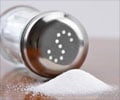A new study has claimed that half a teaspoon reduction in the consumption of salt every day could save 100,000 lives.
Experts claim that lessening half a teaspoon of salt daily, equivalent to 1,200 milligrams of sodium, can prevent up to 120,000 new cases of coronary heart disease, 66,000 strokes and 99,000 heart attacks.Kirsten Bibbins-Domingo, lead author of the study, associate professor of medicine and epidemiology at the University of California, San Francisco and co-director of the UCSF Center for Vulnerable Populations at the San Francisco General Hospital, insists, "the numbers are huge."
The recommend daily intake for adults up to age 50 is 1,500 mg, while the upper limit is 2,300 mg.
But the average intake in Canada is about 3,100 mg, while in the U.S., it's about 3,400 mg.
"This again just highlights the increasing amount of evidence that we need to, as a society, reduce the amount of salt that's added to food. That's really the issue at the end of the day," Globe and Mail quoted Norm Campbell, Canadian research chair in hypertension prevention and control, as saying.
Bibbins-Domingo estimated the benefits of population-wide sodium reduction using a sophisticated computer simulation program called the 'Coronary Heart Disease Policy Model.'
Advertisement
However, Kevin Willis, director of partnerships at the Canadian Stroke Network admits that the figure may not be accurate.
Advertisement
The study has been published in the New England Journal of Medicine online.
Source-ANI
RAS









